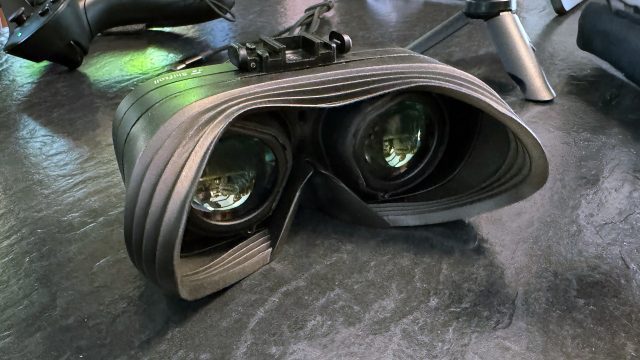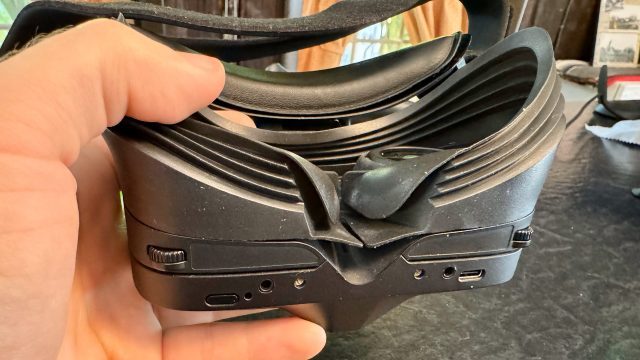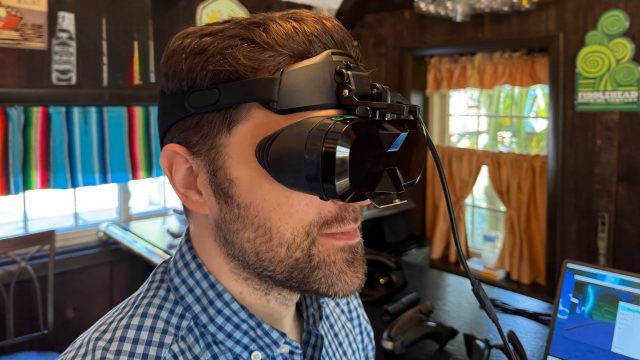Japan-based Shiftall is the most recent firm making an effort to ship an ultra-compact VR headset for lovers who’re keen to spend massive on maximizing their PC VR expertise. Regardless of the tiny package deal, the MeganeX Superlight headset nonetheless manages to ship the optical changes that ought to be normal for each headset. Although undoubtedly costly, the headset general is promising, supplied the corporate can finalize just a few tweaks earlier than crossing the end line.
Accessible for pre-order in Japan, United States, EU & UK, the $1,900 MeganeX Superlight from Shiftall is purportedly set to begin transport between February and March of subsequent 12 months. You possibly can take a look at the total breakdown of specs right here.
It is a tethered headset designed for the SteamVR ecosystem. Shiftall is promoting the headset by itself, which implies you’ll must carry your individual SteamVR Monitoring beacons and controllers—or drop one other $580 to purchase them new.
This week I acquired to take a look at a prototype model of the MeganeX Superlight headset and located it to be a promising piece of {hardware} that’s sure to be held again by its steep value.
Shiftall CEO Takuma Iwasa informed me the headset is primarily focused towards hardcore VR customers, particularly these spending lengthy stretches in VRChat. Contemplating his personal declare of greater than 3,000 hours in VRChat, it’s clear he has an actual understanding of the wants of this sort of buyer.
That’s what led the corporate to strive constructing a compact PC VR headset: Iwasa needs to ship one thing that’s light-weight and comfy for lengthy classes.
An enormous a part of a VR headset being snug is about having the ability to modify it to suit every particular person. Getting the headset’s lenses into the best place on your eyes is essential to maximizing visible high quality and luxury.
To that finish, I used to be completely satisfied to see the MeganeX Superlight features a checklist of optical changes that I’ve lengthy wished was normal on each headset: IPD, eye-relief, diopter, a flip-up visor, and even a lens angle adjustment.

IPD (or interpupillary distance) is normal on most headsets, it’s the gap between the lenses. Matching the gap between the lenses to the gap between your eyes is vital to creating it straightforward on your eyes to fuse the stereoscopic picture, and for getting your eyes into the ‘candy spot’ of the lens (the optical middle, the place the lens has the best).
On the MeganeX Superlight, IPD is about by getting into your IPD measurement into the software program in your laptop, inflicting the headset’s motorized lenses to maneuver into the specified place.
Eye-relief is much less frequent to search out on VR headsets. That is the gap from the lens to your eye. Not solely is that this vital for maximizing field-of-view, it’s additionally vital for dialing within the ‘candy spot’ of the lens. That’s as a result of the candy spot isn’t only a aircraft, it’s a quantity (technically talking, that is typically known as the ‘eye-box’).
On the MeganeX Superlight, the mount which connects the headset itself to the headstrap makes it straightforward to regulate eye-relief by pinching a pair of pads which lets you freely slide the headset nearer or farther away out of your eyes.
Diopter is even rarer than eye-relief. This setting modifications the main target of the lens to account for an individual’s imaginative and prescient correction wants. Quite than carrying glasses, customers can dial of their diopter to take pleasure in a pointy view.

On Shiftall’s headset, there’s a small dial close to the facet of every lens which is used to regulate the diopter for every eye. Though this can be a handbook course of (ie: you may’t simply enter a price and have the headset set it routinely), Shiftall tells me that a part of the headset’s setup course of will embody a calibration display to make this course of simpler.
Whereas a rising variety of headsets embody first rate passthrough views by way of exterior cameras, if the purpose is to easily look exterior of your headset, it’s exhausting to beat your very personal eyes. To that finish the MeganeX Superlight has a bit of plunger on the headstrap mount that makes it fast and simple to flip up the visor for a glimpse of the skin world, and to flip it again down if you’re finished.
And final however not least—one thing I’ve seen on just one different firm’s headsets—is an impartial lens angle adjustment.
Many VR headsets have a pivot on the level the place their headstrap connects to the headset, however the angle is completely on the mercy of how the facepad rests on the person’s face.
Then again, as a result of the MeganeX Superlight headset basically hangs down out of your brow, a small dial on the facet of the mount permits you to independently modify the angle of the headset (and thus the lenses) no matter how the headstrap is resting in your head.
Taken all collectively, these changes make it simpler for a wider vary of individuals to get one of the best and most snug visible expertise from the headset.
And for those who’re planning to pay practically $2,000 for a headset that’s not solely compact, but in addition features a whopping 13.6MP (3,552 × 3,840) micro-OLED show per-eye, you’re undoubtedly going to need it to have the changes essential to provide the finest visuals it will probably.
The MeganeX Superlight’s shows are extremely crisp, to the purpose that there’s merely no seen pixels, sub-pixels, or perhaps a trace of screen-door impact that I may see in my time with the headset. The digital world not solely seems to be utterly sharp and strong due to all of these pixels, it additionally seems to be very vivid due to the wealthy colours and deep blacks proven by the 10-bit show.
Whereas I would like extra time with the headset to make sure, my preliminary impression from reminiscence was that the MeganeX Superlight felt prefer it had a barely bigger field-of-view, barely bigger candy spot, and fewer glare in comparison with Bigscreen Past (its nearest competitor).
From a decision standpoint, there’s so few examples of VR content material that truly have the underlying graphical constancy to indicate a significant distinction—between Bigscreen Past’s spectacular 6.5MP (2,560 × 2,560) per-eye decision and the MeganeX Superlight’s much more spectacular 13.6MP (3,552 × 3,840) per-eye decision—that the advance wasn’t clearly noticeable.
But it surely stands to motive that the MeganeX Superlight ought to be the superior headset in instances the place excessive resolving energy is most vital, like in flight simulators the place lengthy sightlines to distant objects are frequent, and for digital desktops the place resolving tremendous textual content is essential. I’m particularly to strive the MeganeX Superlight for the latter.
Whereas higher resolving energy is all the time a plus, there’s no query that if you wish to run VR content material wherever close to the headset’s native decision, you’re going to wish to pair it with top-tier PC.
On the headset’s native 13.6MP per-eye decision and 90Hz refresh charge, your laptop might want to pump out an absurd 2.5 gigapixels per second (assuming naive stereoscopic rendering). [Note: Shiftall says the MeganeX Superlight only works with modern NVIDIA GPUs. AMD is not supported at present.]
For those who don’t have already got (or aren’t planning to purchase) an NVIDIA 3080, 4080, or higher, it’s exhausting to make a case for paying $1,900 for the additional pixels on MeganeX Superlight over the $1,000 Bigscreen Past (assuming each headsets have been in any other case equal).

Whereas I used to be impressed with the array of optical changes, gorgeous decision, and vibrant colours of the MeganeX Superlight, I’ve the identical reservation in regards to the headset that I did with Bigscreen Past: the shortage of built-in audio is a giant oversight. I perceive that there’s some folks on the market who’re completely satisfied to cope with placing on their very own headphones or earbuds over prime of their headset, however my intestine is that most individuals want the comfort of not having to cope with yet one more factor to placed on.
Bigscreen Past has since rectified this situation with an non-compulsory headstrap with on-board audio. And making it non-compulsory is ok; the individuals who need it will probably get it, and those who need to use their very own aren’t caught with it.
Shiftall tells me it’s additionally planning to construct an non-compulsory headstrap with on-board audio, but it surely received’t be out there (or most likely even introduced) earlier than the headset begins transport early subsequent 12 months. I perceive that making and launching {hardware} is extraordinarily tough, but it surely’s an actual disgrace to not have an audio headstrap out there at launch.
One other situation I noticed throughout my time with the headset is a few pupil-swim within the lenses. Meaning when your eyes transfer in clean pursuit (versus saccading) throughout the lens, the scene appears to warp in an uncomfortable means.
That is usually a difficulty with poor lens calibration, and it isn’t unusual with prototype headsets which aren’t being made with last tooling or calibration processes.
Whereas there’s no motive to suppose the corporate can’t dial in its lens calibration earlier than launch, getting it proper is essential. So it’s one thing I’ll undoubtedly need to get one other have a look at nearer to the headset’s launch.
Assuming Shiftall manages to enhance the pupil-swim—because it says it expects to—the corporate is on observe to ship a reasonably spectacular headset. The one main points are that of value and the shortage of on-board audio. These two components be sure that the MeganeX Superlight will stay a distinct segment headset. But when the corporate can discover a clutch of customers that need what it’s providing, it should have additional confirmed out the existence of a hardcore PC VR crowd that’s keen to spend massive to maximise their VR expertise.
